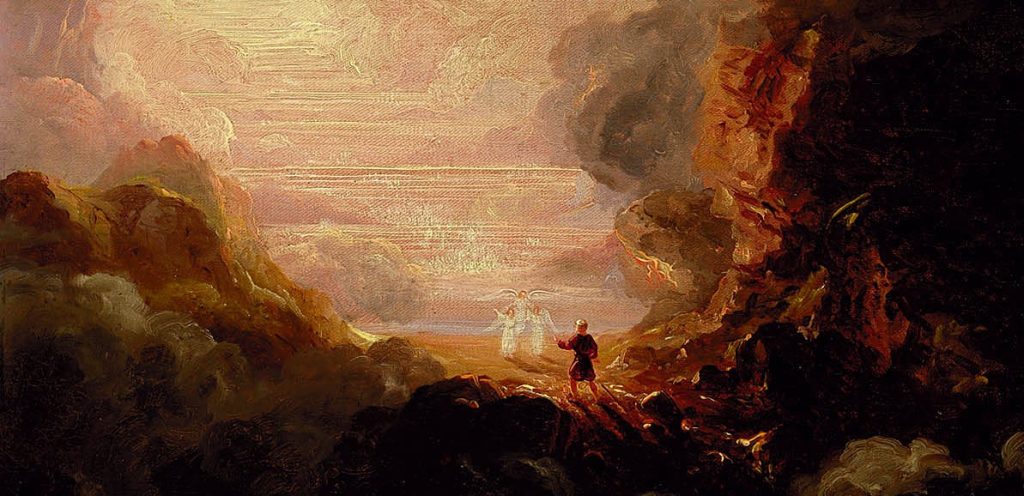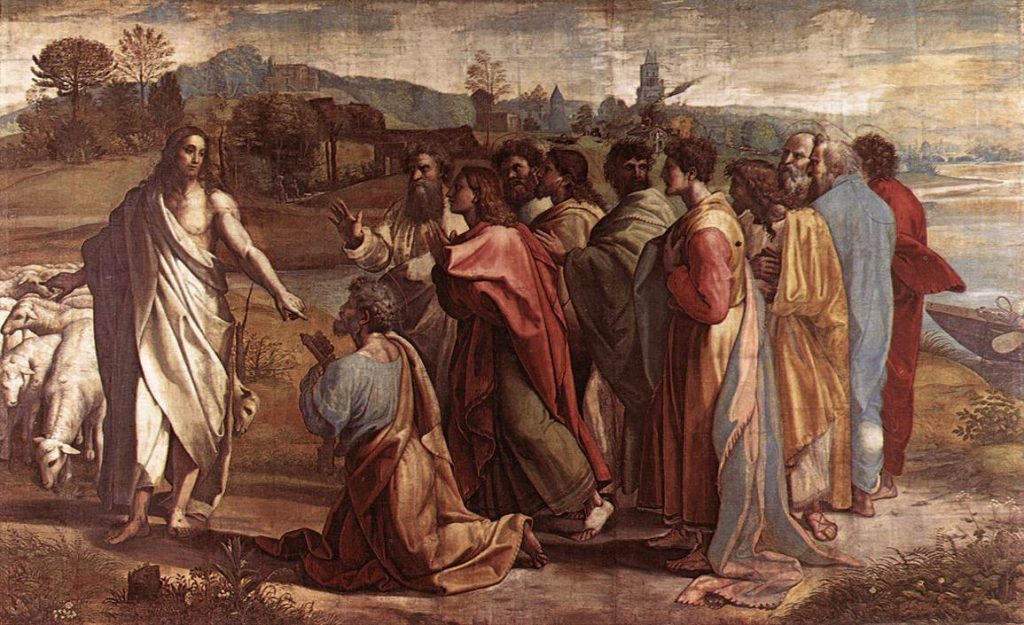
Mass Readings for the 5th Sunday in Ordinary Time:
Isaiah 6.1-8 Psalm 138.1-5, 7-8 I Corinthians 15.1-11 Luke 5.1-11
It is uncomfortable to be confronted by the Lord. In his presence, I think we all would shrink back. If he comes to you or I, shows us the truth of things, and reminds us of the demands of his law of love, as much as we might want to run, we mustn’t, but stand firm in faith and listen, watch and obey.
We know it’s futile to run from God; but that doesn’t stop most of us from trying to hide from him, or at the very least, ostrich-like, to bury our heads in the sand; by worldly distraction and self-centered preoccupation keep from listening to his voice, and heeding his signs.
That is why today we must be attentive to these stories of encounter with the divine, of Isaiah and of Simon who would later be called Peter. We are to learn from them.
Are we prepared for an encounter with the divine? Do we want one? What would that be for us? A vision, perhaps? Or something more solid; an incarnation of some kind?
Where do we meet God in this world?
In Christ that there is an altering of the dynamic in humanity’s relationship with God. Or rather, a coming to awareness that we relate to God not just in terms of a vertical axis, that is, we’re down here and God is up there in heaven; but that Christ makes us conscience of the horizontal axis of reality and God’s presence in this world. In our Catholic understanding, God reveals himself in this world. In the midst of the things that happen, through the people we meet, the Holy Spirit informs us of God’s will.
This was the experience of the first generation of the Church, the disciples who had walked with Jesus. That was foundational. By knowing Jesus, Christ could be recognized in others, and the Holy Spirit perceived in events and happenings; and not always in the positive. That is, Christ is seen at work in acts of genuine charity; but he is also paradoxically seen in the evils of injustice, deceit, violence, etc. Not in the evils and vices themselves, but our revulsion at them is a summons from the Holy Spirit to act against them.
Jesus brings these two axes, the vertical and the horizontal together. This finds no better expression than in the arms of the cross. This is the terrifying and strangely comforting image of God in our lives.
We see these axes illustrated in the contrasting stories of Isaiah and Simon Peter. Isaiah stands quite literally at the feet of God, and can only see the skirts of his robe. The rest of God disappears up through the ceiling of the Temple!
And then we have Simon Peter’s encounter with Christ standing opposite him, Jesus and the future chief apostle are eye-to-eye; and how interesting that Simon’s instinct, upon realizing that somehow God is present in that moment, is to fall to his knees, reasserting the vertical relationship.

So, are we ready for an encounter with God in this world?
So that we can properly consider our own situations, let’s look to Isaiah and Simon Peter as two contrasting examples of the human predicament.
Our sense of Isaiah as a great prophet is very much informed by our knowledge of him in retrospect. His reputation among us comes from the time after the vision in the Temple. Up to that point, Isaiah is a full-fledged member of the elite of Judea. He is a direct descendant of Jacob’s son Judah. He is a member of the royal family, a first cousin of the king. He is a man who lives in a palace, with servants, enjoying a lifestyle like that of a 19th century European gentleman – that is, he didn’t have to work for a living.
Now, if we understand Isaiah to already to be a prophet at the time of his vision, we need to make an important distinction between “court prophets” and the prophets we know from scripture.
Like a second son of a duke or earl, that is, a man who is not going to inherit the bulk of his father’s estate, such men did have to find a position in society. Isaiah had the usual choices of the nobly born: he could go into the army or the “church” (that is, into the ranks of the religious leadership). Now in Israel, as we recall from our scriptures, the priesthood and the Levites were hereditary institutions. You couldn’t buy your way in. However, the offices of scribe and prophet were open to those willing to do the study and formation required.
And between the two, being a prophet of the royal court was the better as it made you more than a bureaucrat. Rather, you would be a spiritual advisor to the king. Prophets speak for God, and the king would want to know what’s on God’s mind.
This might seem strange to us. Scripture tells us it’s God who chooses who will be a prophet, not the individual. What we might then think of such men is that they were more like those we today call theologians.
So, what we have in Isaiah is a highly educated person who is steeped in the study of the scriptures, of the law of Moses, but also the broader religious tradition of Israel.
His service to the king would take the form of finding ways of presenting royal initiatives to the nobility and the common people as being grounded in the will of God. So, Isaiah was like one of those unseen advisors to our premiers and prime ministers – he figures out what spin to put on the message to make it maximally appealing to the population, and pre-emptively deflects criticism. He’s the guy who helps put together “the narrative” that the rest of the elites, the establishment, (in our day, the media) are going to adopt that tells a story that casts the leader in the role of hero, defender of the right and protector of the people.
Isaiah would be fully invested in this role, and understand himself as being a useful member of his society, and a good man.
And then, sometime after the death of his cousin the king Uzziah, all of this his self-understanding is shattered, and he now sees himself in entirely different terms. For in the great vision, he sees the king he ought to have been serving all this time; and that he had been serving the very narrow interests of his cousin the king, his family, himself, and doing so through half-knowing self-deception.
And now, he sees plainly, he is a man with unclean lips: his words have been lies, his language that of deception and manipulation, and his loyalty entirely misplaced.
And yet, God will still have him. And acknowledging his unworthiness, the angels bring that glowing coal and burns off the pollution from his mouth. From that day forward, Isaiah is a true prophet; and as unwelcome as that is to the new king of Israel, Isaiah is at last a man of integrity and true faith, destined now to walk with God into eternity – but at a cost. He gives it all up, the palaces and the place of honor in the royal court to be the faithful prophet; and while our scriptures don’t speak of Isaiah’s death, Jewish tradition holds that he is eventually martyred by the king for his opposition to foolish and unfaithful policies.

Simon Peter is someone a little more familiar. Unlike some of Jesus’ other disciples, we have no report of him being in any way notorious. So, why is his first reaction to the miraculous catch of fish grounded in his sinfulness? – “Go away from me, for I am a sinful man.”
Simon Peter was a respectable man who ran his family’s fishing business and took some interest in religious matters in the way any somewhat conscientious member of society would. He’s like most people we meet today – generally good-natured, not looking for trouble, trying to do the right thing on a day-to-day basis; not terribly concerned with the big picture, and rather happy to not be too involved in dealing with it.
Yet when confronted with Christ, who he still does not know properly, he has the deep sense of himself as having failed God, to have sinned, at the very least by omission, by that lack of concern. And yet, Christ, summons him to this great enterprise of world transformation through the Gospel of Love and Truth. He will be a fisher of people, baiting the hook with the Good News of resurrection and eternal life in Jesus Christ.
Today we are confronted with events and personalities that challenge us and should have us ask, where is Christ in this? Is this person of Christ?
And we must evaluate what we see according to what we know of our Lord. We remember that at heart, as St. John famously put it, God is love. We also remember Jesus’ own words, “I am the way, the truth and the life…”
I’ve already spoken of seeing the way of charity in others.
If Christ is truth, we ought to see that as a concern of the godly. Where there are lies, mischaracterizations, slander, selective and unbalanced reports, an unwillingness to engage in discussion in search of wisdom, for the fuller discovery of truth, where we see there is little concern for truth and a prioritizing of “the narrative” – this is not of God. That absence speaks, and prompts us to speak.
People who value truth are very careful with it, aware that as limited human beings we can never claim to have the whole of it, and so are modest in what we assert as true – that is little valued today by our media who are more inclined to gin up antagonisms for their masters. If anything, the evidence of Christ lies in a speaker’s economy of words so as to avoid speaking what is not true.
… and life. Do we see life? Or do we see fear of life? Do we see threats of violence and punishment rather than an invitation to true life in freedom and peace? Do we see people living in joy even in the midst of adversity as a community? Or are we witnesses to selfish resentment, vicious divisions and demands for retribution from the comfortable?
God is surely among us. Encountered in word and sacrament, but also in the world where he speaks his truth softly and shows us the distress of his people, for those who have ears to hear, and eyes to see, the faith to act, the hope for better times and the love that will heal and reconcile.
Amen.
Live streaming alternatives: